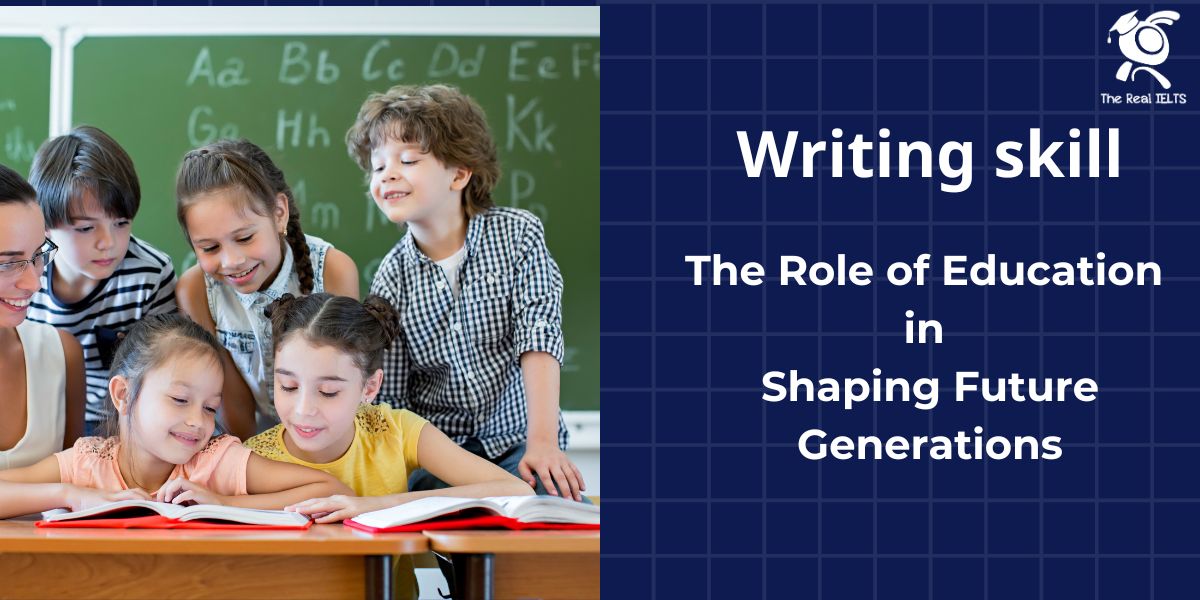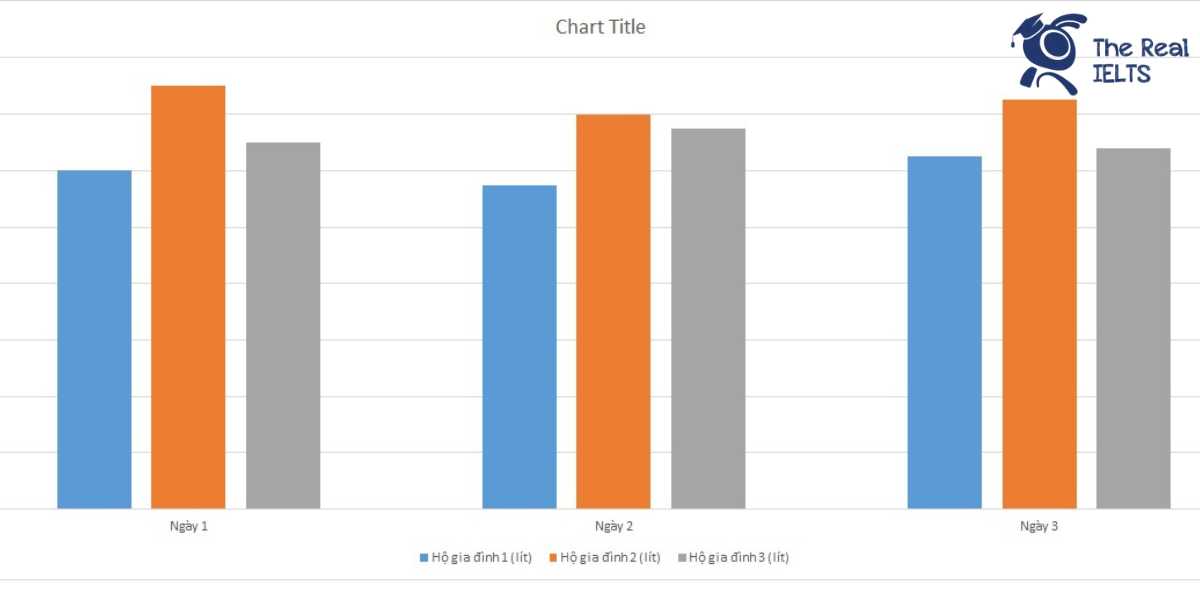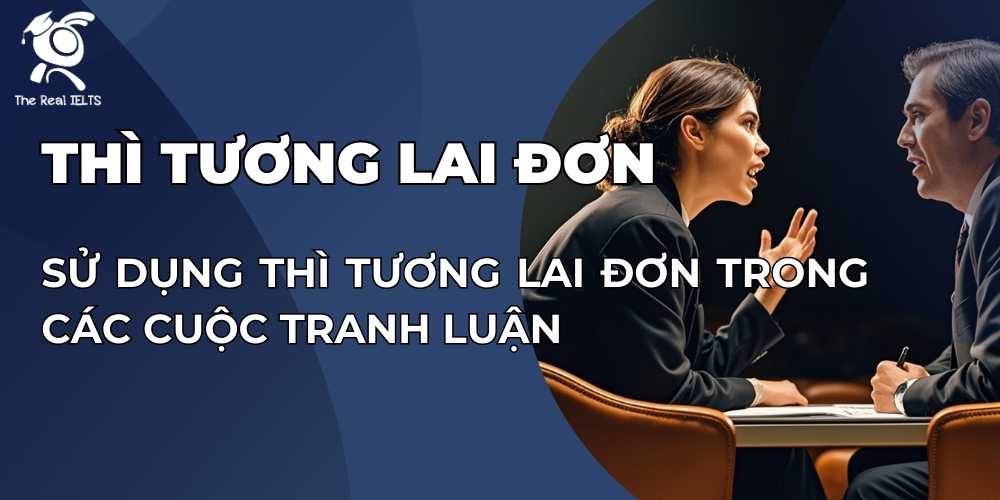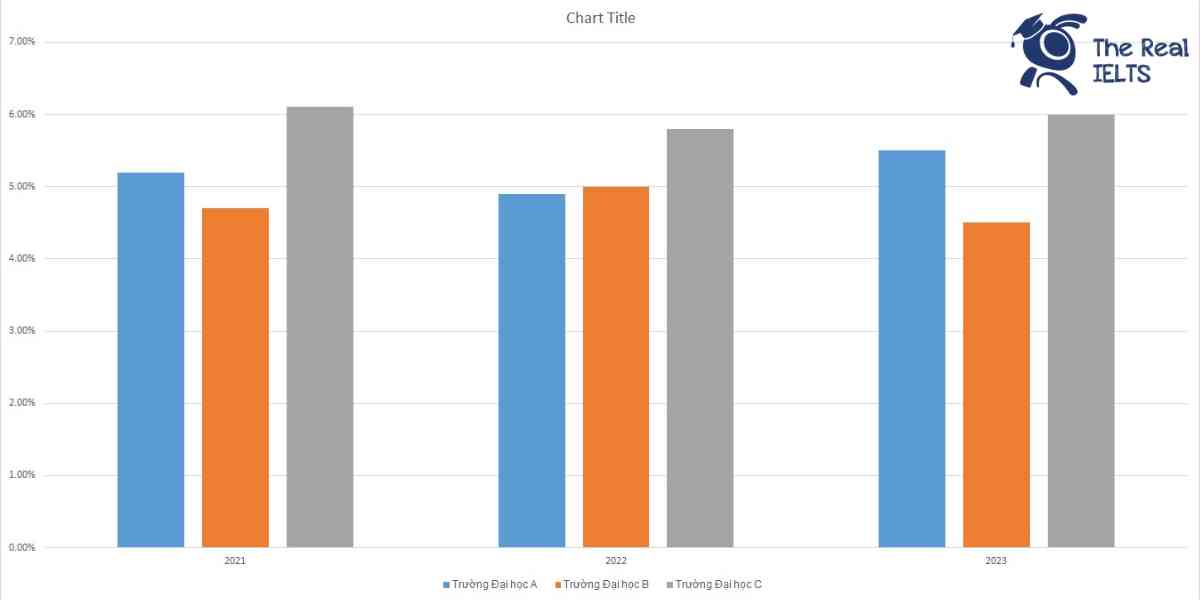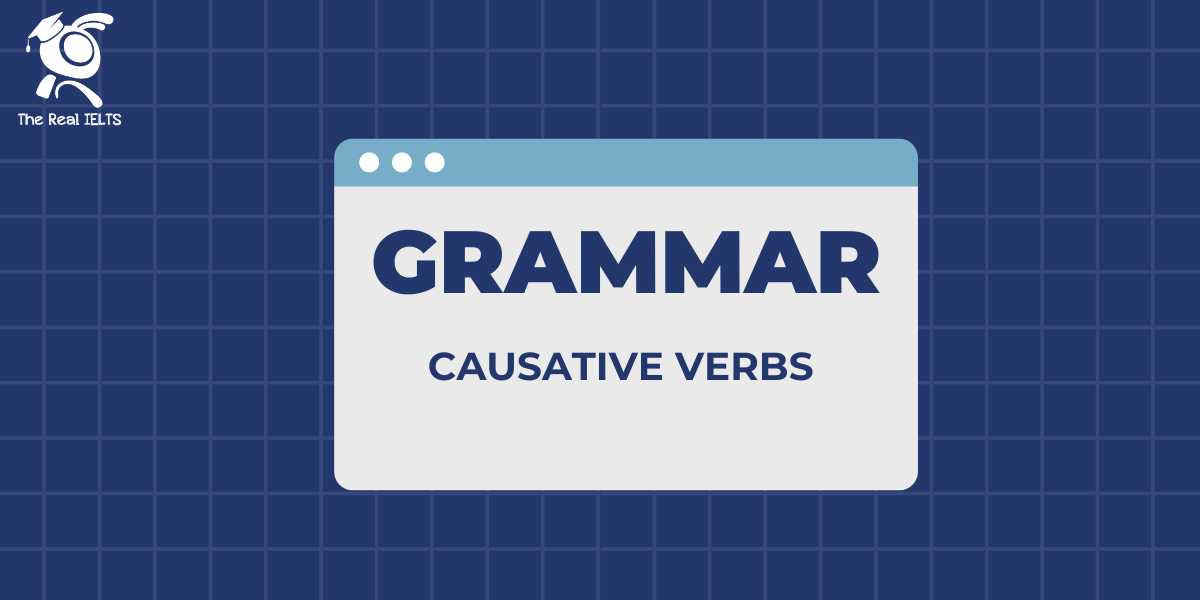Chủ đề Writing part 13 là nói về vai trò của giáo dục đối với thế hệ trẻ. Đây là chủ đề về xã hội, không thiên hẳn về học thuật nên chúng ta có thể viết dàn ý như sau:
Writing Outline: The Role of Education in Shaping Future Generations
I. Introduction
A. Definition of education
B. Importance of education in society
C. Thesis statement: Education plays a crucial role in shaping future generations by providing knowledge, fostering critical thinking, and promoting social and emotional development.
II. Knowledge Acquisition
A. Basic literacy and numeracy
- Importance of reading and writing skills
- Role of math in everyday life
B. Advanced knowledge and specialized skills - Science, technology, engineering, and mathematics (STEM)
- Humanities and social sciences
C. Lifelong learning - Adaptation to changing job markets
- Continuous personal growth and development
III. Fostering Critical Thinking
A. Developing problem-solving skills
- Analytical thinking
- Creative solutions
B. Encouraging independent thinking - Questioning assumptions
- Evaluating evidence and arguments
C. Promoting innovation and creativity - Role in technological advancement
- Impact on cultural and artistic expression
IV. Promoting Social and Emotional Development
A. Building interpersonal skills
- Communication and collaboration
- Empathy and understanding
B. Encouraging ethical and moral development - Understanding societal norms and values
- Promoting civic responsibility
C. Supporting mental health and well-being - Stress management and resilience
- Creating a supportive learning environment
V. Preparing for Global Citizenship
A. Understanding global issues
- Environmental sustainability
- Social justice and human rights
B. Promoting cultural awareness and diversity - Learning about different cultures and traditions
- Embracing multiculturalism and inclusivity
C. Developing a global perspective - Encouraging international collaboration
- Preparing for a globalized workforce
VI. Challenges and Solutions in Education
A. Addressing inequality in education
- Access to quality education for all
- Bridging the digital divide
B. Adapting to technological advancements - Integrating technology in the classroom
- Preparing students for digital literacy
C. Ensuring relevance in a changing world - Updating curricula to meet current and future needs
- Engaging with stakeholders for continuous improvement
VII. Conclusion
A. Recap of the main points
B. Restating the thesis
C. Final thoughts on the transformative power of education for future generations
Từ vựng và cụm từ vựng về chủ đề Education
I. Introduction
- Education – Giáo dục
- Acquiring knowledge – Tiếp thu kiến thức
- Skills – Kỹ năng
- Values – Giá trị
- Attitudes – Thái độ
- Forms of learning – Các hình thức học tập
- Cornerstone of society – Nền tảng của xã hội
- Navigate – Điều hướng
- Contribute – Đóng góp
- Crucial role – Vai trò quan trọng
- Shaping future generations – Định hình thế hệ tương lai
- Knowledge – Kiến thức
- Fostering critical thinking – Thúc đẩy tư duy phản biện
- Promoting social and emotional development – Thúc đẩy sự phát triển xã hội và cảm xúc
II. Knowledge Acquisition
- Fundamental roles – Vai trò cơ bản
- Impart knowledge – Truyền đạt kiến thức
- Basic literacy – Biết chữ cơ bản
- Numeracy – Khả năng tính toán
- Essential skills – Kỹ năng thiết yếu
- Reading and writing – Đọc và viết
- Communication – Giao tiếp
- Problem-solving – Giải quyết vấn đề
- Logical reasoning – Lý luận logic
- Advanced knowledge – Kiến thức nâng cao
- Specialized skills – Kỹ năng chuyên môn
- Fields – Lĩnh vực
- Science, technology, engineering, and mathematics (STEM) – Khoa học, công nghệ, kỹ thuật và toán học (STEM)
- Humanities and social sciences – Nhân văn và khoa học xã hội
- Insights – Hiểu biết
- Human behavior – Hành vi con người
- Culture – Văn hóa
- Society – Xã hội
- Well-rounded understanding – Hiểu biết toàn diện
- Lifelong learning – Học tập suốt đời
- Job market – Thị trường việc làm
- Continuous personal growth – Phát triển cá nhân liên tục
- Adapt – Thích nghi
- Challenges – Thách thức
- Opportunities – Cơ hội
- Relevance – Sự phù hợp
- Competitiveness – Khả năng cạnh tranh
III. Fostering Critical Thinking
- Critical thinking skills – Kỹ năng tư duy phản biện
- Analyzing information – Phân tích thông tin
- Considering various perspectives – Cân nhắc các quan điểm khác nhau
- Analytical thinking – Tư duy phân tích
- Creative solutions – Giải pháp sáng tạo
- Independent thinking – Tư duy độc lập
- Questioning assumptions – Đặt câu hỏi về giả định
- Evaluate evidence – Đánh giá chứng cứ
- Construct well-founded arguments – Xây dựng lập luận có cơ sở
- Informed decisions – Quyết định có thông tin
- Personal and professional contexts – Ngữ cảnh cá nhân và chuyên nghiệp
- Innovation – Sự đổi mới
- Creativity – Sự sáng tạo
- Experimentation – Thử nghiệm
- Exploration – Khám phá
- Technological advancements – Tiến bộ công nghệ
- Cultural and artistic expressions – Biểu hiện văn hóa và nghệ thuật
- Progress of society – Sự tiến bộ của xã hội
IV. Promoting Social and Emotional Development
- Social and emotional development – Phát triển xã hội và cảm xúc
- Interpersonal skills – Kỹ năng giao tiếp cá nhân
- Communication and collaboration – Giao tiếp và hợp tác
- Empathy – Sự đồng cảm
- Understanding – Sự hiểu biết
- Meaningful relationships – Mối quan hệ có ý nghĩa
- Communities – Cộng đồng
- Ethical and moral development – Phát triển đạo đức và luân lý
- Societal norms and values – Chuẩn mực và giá trị xã hội
- Civic responsibility – Trách nhiệm công dân
- Ethical behavior – Hành vi đạo đức
- Just and equitable society – Xã hội công bằng và bình đẳng
- Mental health and well-being – Sức khỏe tâm thần và hạnh phúc
- Stress management – Quản lý căng thẳng
- Resilience – Sự kiên cường
- Supportive learning environment – Môi trường học tập hỗ trợ
- Sense of belonging – Cảm giác thuộc về
- Self-worth – Giá trị bản thân
V. Preparing for Global Citizenship
- Global citizenship – Công dân toàn cầu
- Interconnected world – Thế giới kết nối
- Global issues – Vấn đề toàn cầu
- Environmental sustainability – Bền vững môi trường
- Social justice – Công bằng xã hội
- Human rights – Nhân quyền
- Cultural awareness – Nhận thức văn hóa
- Diversity – Đa dạng
- Inclusivity – Sự bao gồm
- Multiculturalism – Đa văn hóa
- Global cooperation – Hợp tác toàn cầu
- Global perspective – Quan điểm toàn cầu
- International collaboration – Hợp tác quốc tế
- Globalized workforce – Lực lượng lao động toàn cầu
VI. Challenges and Solutions in Education
- Challenges – Thách thức
- Inequality in education – Bất bình đẳng trong giáo dục
- Access to quality education – Tiếp cận giáo dục chất lượng
- Socioeconomic status – Tình trạng kinh tế xã hội
- Digital divide – Khoảng cách số
- Technological advancements – Tiến bộ công nghệ
- Integrating technology – Tích hợp công nghệ
- Digital literacy – Sự hiểu biết về kỹ thuật số
- Relevance – Sự phù hợp
- Curricula – Chương trình giảng dạy
- Stakeholders – Các bên liên quan
- Continuous improvement – Cải tiến liên tục
- Innovation – Đổi mới
VII. Conclusion
- Recap – Tóm tắt
- Main points – Các điểm chính
- Restating the thesis – Nhắc lại luận điểm
- Final thoughts – Suy nghĩ cuối cùng
- Transformative power of education – Sức mạnh chuyển đổi của giáo dục
- Equipped with the tools – Được trang bị các công cụ
- Navigate and contribute – Điều hướng và đóng góp
- Ever-evolving world – Thế giới luôn thay đổi
Triển khai bài viết
The Role of Education in Shaping Future Generations
I. Introduction
Education is the process of acquiring knowledge, skills, values, and attitudes through various forms of learning. It is a cornerstone of society, providing individuals with the tools they need to navigate and contribute to the world. Education plays a crucial role in shaping future generations by providing knowledge, fostering critical thinking, and promoting social and emotional development.
II. Knowledge Acquisition
One of the fundamental roles of education is to impart knowledge. Basic literacy and numeracy are essential skills that enable individuals to function effectively in daily life. Reading and writing are foundational for communication, while math skills are crucial for problem-solving and logical reasoning.
As individuals progress in their educational journey, they acquire advanced knowledge and specialized skills. Fields such as science, technology, engineering, and mathematics (STEM) are vital for technological advancement and innovation. Humanities and social sciences, on the other hand, provide insights into human behavior, culture, and society, fostering a well-rounded understanding of the world.
Moreover, education promotes lifelong learning, which is essential in a rapidly changing job market. Continuous personal growth and development allow individuals to adapt to new challenges and opportunities, ensuring their relevance and competitiveness.
III. Fostering Critical Thinking
Education is instrumental in developing critical thinking skills. It encourages students to solve problems by analyzing information and considering various perspectives. Analytical thinking and creative solutions are nurtured through a well-rounded education, preparing students to tackle complex issues.
Independent thinking is another critical aspect fostered by education. Students learn to question assumptions, evaluate evidence, and construct well-founded arguments. This skill is vital for making informed decisions in both personal and professional contexts.
Furthermore, education promotes innovation and creativity. By encouraging experimentation and exploration, education drives technological advancements and enriches cultural and artistic expressions, contributing to the progress of society.
IV. Promoting Social and Emotional Development
Education also plays a significant role in social and emotional development. It helps build interpersonal skills such as communication and collaboration, which are essential for working effectively with others. Empathy and understanding are cultivated, enabling individuals to form meaningful relationships and contribute positively to their communities.
Ethical and moral development is another key component. Education helps students understand societal norms and values, promoting civic responsibility and ethical behavior. This foundation is crucial for creating a just and equitable society.
Moreover, education supports mental health and well-being. It teaches stress management and resilience, helping students cope with challenges and setbacks. A supportive learning environment is vital for fostering a sense of belonging and self-worth, which are essential for overall well-being.
V. Preparing for Global Citizenship
In an increasingly interconnected world, education prepares individuals for global citizenship. It provides an understanding of global issues such as environmental sustainability, social justice, and human rights. This knowledge is essential for addressing the complex challenges facing our world today.
Education also promotes cultural awareness and diversity. Learning about different cultures and traditions fosters inclusivity and respect for diversity. Embracing multiculturalism enriches society and enhances global cooperation.
Developing a global perspective is another crucial aspect. Education encourages international collaboration and prepares students for a globalized workforce. This preparation is vital for success in a world where borders are becoming increasingly irrelevant.
VI. Challenges and Solutions in Education
Despite its importance, education faces several challenges. One significant issue is inequality in education. Ensuring access to quality education for all, regardless of socioeconomic status, is crucial. Bridging the digital divide is also essential, as technology becomes more integral to learning.
Adapting to technological advancements is another challenge. Integrating technology in the classroom enhances learning experiences and prepares students for the digital age. Educators must also focus on developing digital literacy skills to ensure students can navigate the digital world effectively.
Ensuring the relevance of education in a changing world is also vital. Curricula must be updated regularly to meet current and future needs. Engaging with stakeholders, including educators, students, and employers, is essential for continuous improvement and innovation in education.
VII. Conclusion
In conclusion, education is a powerful tool for shaping future generations. It provides the knowledge and skills necessary for personal and professional success, fosters critical thinking and innovation, and promotes social and emotional development. By addressing challenges and adapting to changing needs, education can continue to transform lives and build a better future for all. The transformative power of education lies in its ability to equip individuals with the tools they need to navigate and contribute to an ever-evolving world.
Cấu trúc ngữ pháp và cấu trúc câu
Cấu Trúc Câu và Ngữ Pháp Trong Bài Viết
I. Introduction
- Simple Sentence: Education is the process of acquiring knowledge, skills, values, and attitudes through various forms of learning.
- Simple Sentence Structure: Subject (Education) + Verb (is) + Complement (the process of acquiring knowledge, skills, values, and attitudes through various forms of learning).
- Compound Sentence: It is a cornerstone of society, providing individuals with the tools they need to navigate and contribute to the world.
- Compound Sentence Structure: Independent Clause (It is a cornerstone of society) + Coordinating Conjunction (,) + Independent Clause (providing individuals with the tools they need to navigate and contribute to the world).
- Complex Sentence: Education plays a crucial role in shaping future generations by providing knowledge, fostering critical thinking, and promoting social and emotional development.
- Complex Sentence Structure: Independent Clause (Education plays a crucial role in shaping future generations) + Dependent Clause (by providing knowledge, fostering critical thinking, and promoting social and emotional development).
II. Knowledge Acquisition
- Complex Sentence: One of the fundamental roles of education is to impart knowledge.
- Complex Sentence Structure: Independent Clause (One of the fundamental roles of education) + Dependent Clause (is to impart knowledge).
- Parallel Structure: Basic literacy and numeracy are essential skills that enable individuals to function effectively in daily life.
- Parallel Structure: Basic literacy and numeracy (two noun phrases) + are essential skills (verb phrase).
- Compound-Complex Sentence: As individuals progress in their educational journey, they acquire advanced knowledge and specialized skills.
- Compound-Complex Sentence Structure: Dependent Clause (As individuals progress in their educational journey) + Independent Clause (they acquire advanced knowledge and specialized skills).
- Relative Clause: Fields such as science, technology, engineering, and mathematics (STEM) are vital for technological advancement and innovation.
- Relative Clause Structure: Main Clause (Fields) + Relative Clause (such as science, technology, engineering, and mathematics (STEM)).
- Gerund Phrase: Promotes lifelong learning.
- Gerund Phrase: Gerund (Promotes) + Object (lifelong learning).
III. Fostering Critical Thinking
- Complex Sentence: Education is instrumental in developing critical thinking skills.
- Complex Sentence Structure: Independent Clause (Education is instrumental) + Dependent Clause (in developing critical thinking skills).
- Relative Clause: That encourages students to solve problems by analyzing information and considering various perspectives.
- Relative Clause Structure: Main Clause (That encourages students) + Relative Clause (to solve problems by analyzing information and considering various perspectives).
- Parallel Structure: Analytical thinking and creative solutions are nurtured through a well-rounded education.
- Parallel Structure: Analytical thinking and creative solutions (two noun phrases) + are nurtured (verb phrase).
- Complex Sentence: By encouraging experimentation and exploration, education drives technological advancements and enriches cultural and artistic expressions.
- Complex Sentence Structure: Dependent Clause (By encouraging experimentation and exploration) + Independent Clause (education drives technological advancements and enriches cultural and artistic expressions).
IV. Promoting Social and Emotional Development
- Complex Sentence: Education also plays a significant role in social and emotional development.
- Complex Sentence Structure: Independent Clause (Education also plays a significant role) + Dependent Clause (in social and emotional development).
- Parallel Structure: Communication and collaboration are essential for working effectively with others.
- Parallel Structure: Communication and collaboration (two noun phrases) + are essential (verb phrase).
- Complex Sentence: It helps build interpersonal skills such as communication and collaboration.
- Complex Sentence Structure: Independent Clause (It helps build interpersonal skills) + Dependent Clause (such as communication and collaboration).
- Gerund Phrase: Teaching stress management and resilience.
- Gerund Phrase: Gerund (Teaching) + Objects (stress management and resilience).
V. Preparing for Global Citizenship
- Complex Sentence: In an increasingly interconnected world, education prepares individuals for global citizenship.
- Complex Sentence Structure: Dependent Clause (In an increasingly interconnected world) + Independent Clause (education prepares individuals for global citizenship).
- Relative Clause: That provides an understanding of global issues such as environmental sustainability, social justice, and human rights.
- Relative Clause Structure: Main Clause (That provides an understanding) + Relative Clause (of global issues such as environmental sustainability, social justice, and human rights).
- Parallel Structure: Cultural awareness and diversity.
- Parallel Structure: Cultural awareness and diversity (two noun phrases).
- Compound Sentence: Embracing multiculturalism enriches society and enhances global cooperation.
- Compound Sentence Structure: Independent Clause (Embracing multiculturalism enriches society) + Coordinating Conjunction (and) + Independent Clause (enhances global cooperation).
VI. Challenges and Solutions in Education
- Complex Sentence: Despite its importance, education faces several challenges.
- Complex Sentence Structure: Dependent Clause (Despite its importance) + Independent Clause (education faces several challenges).
- Gerund Phrase: Ensuring access to quality education for all.
- Gerund Phrase: Gerund (Ensuring) + Object (access to quality education for all).
- Parallel Structure: Integrating technology in the classroom enhances learning experiences and prepares students for the digital age.
- Parallel Structure: Integrating technology in the classroom (gerund phrase) + enhances learning experiences and prepares students for the digital age (compound verb phrase).
- Complex Sentence: Educators must also focus on developing digital literacy skills to ensure students can navigate the digital world effectively.
- Complex Sentence Structure: Independent Clause (Educators must also focus on developing digital literacy skills) + Dependent Clause (to ensure students can navigate the digital world effectively).
VII. Conclusion
- Simple Sentence: In conclusion, education is a powerful tool for shaping future generations.
- Simple Sentence Structure: Subject (In conclusion, education) + Verb (is) + Complement (a powerful tool for shaping future generations).
- Compound Sentence: It provides the knowledge and skills necessary for personal and professional success, fosters critical thinking and innovation, and promotes social and emotional development.
- Compound Sentence Structure: Independent Clause (It provides the knowledge and skills necessary for personal and professional success) + Coordinating Conjunction (,) + Independent Clause (fosters critical thinking and innovation, and promotes social and emotional development).
- Complex Sentence: By addressing challenges and adapting to changing needs, education can continue to transform lives and build a better future for all.
- Complex Sentence Structure: Dependent Clause (By addressing challenges and adapting to changing needs) + Independent Clause (education can continue to transform lives and build a better future for all).
- Complex Sentence: The transformative power of education lies in its ability to equip individuals with the tools they need to navigate and contribute to an ever-evolving world.
- Complex Sentence Structure: Independent Clause (The transformative power of education lies in its ability to equip individuals with the tools they need) + Dependent Clause (to navigate and contribute to an ever-evolving world).
Đọc bài cũ: Writing skill part 12: Enhancing Emotional Intelligence for Personal Growth.


